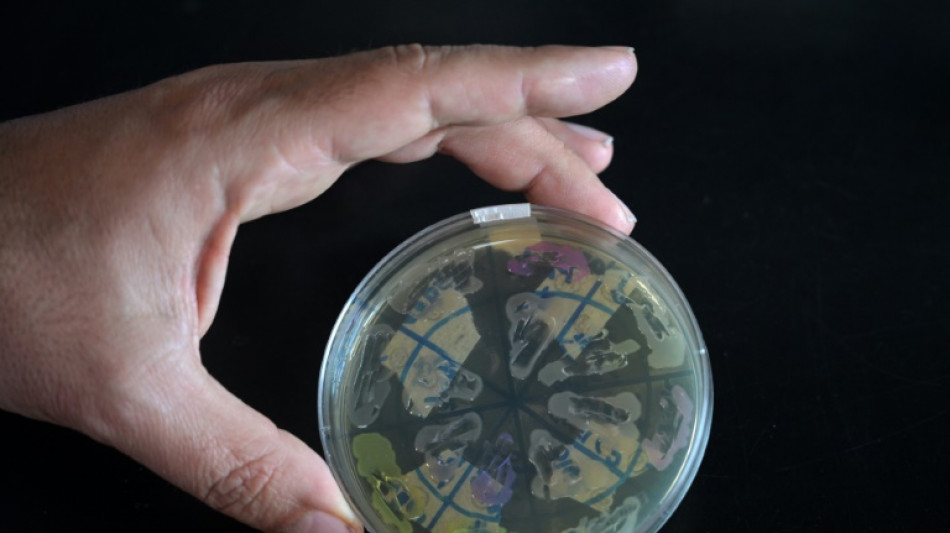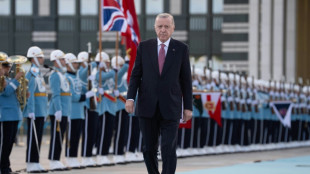
-
 Portugal, Norway book spots at 2026 World Cup
Portugal, Norway book spots at 2026 World Cup
-
Sinner hails 'amazing' ATP Finals triumph over Alcaraz

-
 UK govt defends plan to limit refugee status
UK govt defends plan to limit refugee status
-
Haaland's Norway thump Italy to qualify for first World Cup since 1998

-
 Sweden's Grant captures LPGA Annika title
Sweden's Grant captures LPGA Annika title
-
Tuchel lays down law to Bellingham after England star's frustration

-
 Sinner caps eventful year with ATP Finals triumph over great rival Alcaraz
Sinner caps eventful year with ATP Finals triumph over great rival Alcaraz
-
Portugal book spot at 2026 World Cup as England stay perfect

-
 Hakimi, Osimhen, Salah shortlisted for top African award
Hakimi, Osimhen, Salah shortlisted for top African award
-
Sinner beats great rival Alcaraz to retain ATP Finals title

-
 Schenk wins windy Bermuda Championship for first PGA title
Schenk wins windy Bermuda Championship for first PGA title
-
Crime, immigration dominate as Chile votes for president

-
 Kane double gives England record-setting finish on road to World Cup
Kane double gives England record-setting finish on road to World Cup
-
World champions South Africa add Mbonambi, Mchunu to squad

-
 Greenpeace says French uranium being sent to Russia
Greenpeace says French uranium being sent to Russia
-
'Now You See Me' sequel steals N. American box office win

-
 Argentina beat Scotland after frenzied fightback
Argentina beat Scotland after frenzied fightback
-
Argentina beat Scotland after stunning fightback

-
 Pope urges leaders not to leave poor behind
Pope urges leaders not to leave poor behind
-
Pressure will boost Germany in 'knockout' Slovakia clash, says Nagelsmann

-
 Ecuador votes on hosting foreign bases as Noboa eyes more powers
Ecuador votes on hosting foreign bases as Noboa eyes more powers
-
Portugal qualify for 2026 World Cup by thrashing Armenia

-
 Greece to supply winter gas to war battered Ukraine
Greece to supply winter gas to war battered Ukraine
-
India and Pakistan blind women show spirit of cricket with handshakes

-
 Ukraine signs deal with Greece for winter deliveries of US gas
Ukraine signs deal with Greece for winter deliveries of US gas
-
George glad England backed-up haka response with New Zealand win

-
 McIlroy loses playoff but clinches seventh Race to Dubai title
McIlroy loses playoff but clinches seventh Race to Dubai title
-
Ecuador votes on reforms as Noboa eyes anti-crime ramp-up

-
 Chileans vote in elections dominated by crime, immigration
Chileans vote in elections dominated by crime, immigration
-
Turkey seeks to host next COP as co-presidency plans falter

-
 Bezzecchi claims Valencia MotoGP victory in season-ender
Bezzecchi claims Valencia MotoGP victory in season-ender
-
Wasim leads as Pakistan dismiss Sri Lanka for 211 in third ODI

-
 Serbia avoiding 'confiscation' of Russian shares in oil firm NIS
Serbia avoiding 'confiscation' of Russian shares in oil firm NIS
-
Coach Gambhir questions 'technique and temperament' of Indian batters

-
 Braathen wins Levi slalom for first Brazilian World Cup victory
Braathen wins Levi slalom for first Brazilian World Cup victory
-
Rory McIlroy wins seventh Race to Dubai title

-
 Samsung plans $310 bn investment to power AI expansion
Samsung plans $310 bn investment to power AI expansion
-
Harmer stars as South Africa stun India in low-scoring Test

-
 Mitchell ton steers New Zealand to seven-run win in first Windies ODI
Mitchell ton steers New Zealand to seven-run win in first Windies ODI
-
Harmer stars as South Africa bowl out India for 93 to win Test

-
 China authorities approve arrest of ex-abbot of Shaolin Temple
China authorities approve arrest of ex-abbot of Shaolin Temple
-
Clashes erupt in Mexico City anti-crime protests, injuring 120

-
 India, without Gill, 10-2 at lunch chasing 124 to beat S.Africa
India, without Gill, 10-2 at lunch chasing 124 to beat S.Africa
-
Bavuma fifty makes India chase 124 in first Test

-
 Mitchell ton lifts New Zealand to 269-7 in first Windies ODI
Mitchell ton lifts New Zealand to 269-7 in first Windies ODI
-
Ex-abbot of China's Shaolin Temple arrested for embezzlement

-
 Doncic scores 41 to propel Lakers to NBA win over Bucks
Doncic scores 41 to propel Lakers to NBA win over Bucks
-
Colombia beats New Zealand 2-1 in friendly clash

-
 France's Aymoz wins Skate America men's gold as Tomono falters
France's Aymoz wins Skate America men's gold as Tomono falters
-
Gambling ads target Indonesian Meta users despite ban


Scientists fear underfunded Argentina research on verge of collapse
Argentine biochemist Alejandro Nadra worries that President Javier Milei's budget cuts will undo his scientific quest to unravel the cause of genetic diseases that disable and kill millions.
Since taking office last December, budget-slashing Milei has frozen public university and research budgets even as annual inflation stands at 236 percent.
This meant real spending on science and technology fell 33 percent year-on-year in August, according to the CIICTI research center.
Nadra said he has already had to stop some of his experiments with the proteins responsible for gene mutations that cause diseases.
"We are on the verge of collapse," Nadra told AFP from his laboratory at the University of Buenos Aires, home to three Nobel Prize laureates in science.
Along with artists, teachers, pilots, social workers and countless other professionals affected by Milei's drive to curb flyaway inflation and public debt, scientists fear for their future in Argentina.
"People are leaving, and they aren't applying for scholarships or teaching positions anymore because they can’t make a living," said Nadra.
Those who do often end up working in labs without the necessary equipment or supplies.
"If things don’t change, the time is near when everything disintegrates," said Nadra.
Nadra said he has not been able to buy anything he needs for his research since last November.
"So, if I run out of supplies, I either borrow from someone who still has some, or I stop doing those experiments."
The gross monthly salary of a research assistant today at Argentina's Conicet research council is about 30 percent less, roughly $1,180, than a year ago, according to the RAICYT network science institutes.
Official figures released last week showed that 52.9 percent of people live in poverty in Milei's Argentina.
- 'Drastic reduction' -
Biologist Edith Kordon works at the IFIBYNE state research institute,where she investigates breast cancer.
"This is the first time this has happened to me. I mean, it has always been very hard to get funding, it has always been very hard to get scholarships, but now there is this practical certainty that we have nothing... I’ve never had so little money to do anything," she told AFP.
Former science minister Lino Baranao recently highlighted that even before Milei's cuts, Argentina spent about 0.31 percent of GDP on science compared to 1.21 percent in Brazil, 3.45 percent in the United States and 4.9 percent in South Korea.
Today, it is even less, at about 0.2 percent.
"Never in the recent history of Argentina has there been such a drastic reduction in the (scientific) budget," Baranao told La Nacion newspaper.
In a more prosperous past, state funding of research had made possible the development of a transgenic wheat strain resistant to drought by a Conicet research team, among other life-changing breakthroughs.
Last week, Milei's government adjusted Conicet's working budget upward to just over $100,000 for 2024, a figure which physicist Jorge Aliaga considers "irrelevant" in its inadequacy.
"It doesn’t change anything," he told AFP.
In March, a group of 68 Nobel Prize laureates from around the world expressed concern in an open letter about Argentina's public research system approaching "a dangerous precipice."
Self-described "anarcho-capitalist" Milei, for his part, has hit out at "the so-called scientists and intellectuals who believe that having an academic degree makes them superior beings."
V.AbuAwwad--SF-PST




